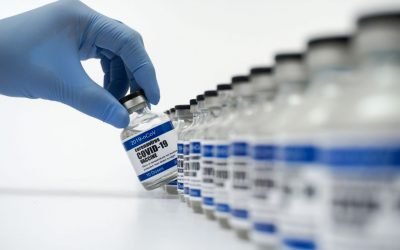The pharmaceutical supply chain in the UK is very complex and highly fragmented. In some cases, pallets of drugs change hands more than five times between leaving the factory and reaching the patient, crossing national borders more than once along the way. Consumers and providers often turn to secondary distribution channels (the ‘grey market’) to acquire cut-price pharmaceutical products, which has added to the complexity of the supply chain and increased the risk of insertion of counterfeit drugs. To complicate this minefield further, Brexit has raised the level of red-tape and potential layers within the supply chain.
Today …
The track-and-trace systems employed at present vary in terms of sophistication and level of adoption. In some cases, members of the same supply chain use different tracking techniques (for example, batch numbering and barcoding), meaning that multiple systems run concurrently for tracking just one drug. There is little consistency in the information required to accompany each drug along the supply chain, or in the methods by which data is stored. The main motivation to harmonise and overcome these problems will come from the NHS. I am seeing increasingly that within the NHS there is a call for a “One Track Solution” for pharmaceuticals.
Tomorrow …
Implementation of a drug pedigree (or ‘mass serialisation’) would considerably reduce the risk of counterfeits entering the pharmaceutical supply chain. It would also control parallel trading (‘grey market’ trading), improve the accuracy of drug administration in hospitals, facilitate more efficient product recalls, improve drug availability and prevent dispensation of out-of-date medicines. These are all benefits that RFID might bring in terms of patient safety in the view of medicines.
In addition to these there are supply chain efficiency benefits that could be attained using RFID. Manufacturers, distributors, wholesalers and retailers would profit from improved inventory accuracy, reduced bureaucracy, better visibility, shorter turnaround times, lower staffing costs and better stock replenishment. There are also large financial incentives in cracking down on drug counterfeiting and parallel trading.
The motivation to harness RFID in the healthcare world is quite different for each party. While supply chain efficiencies make a strong business case for large general retailers, wholesalers and distributors, the case is less obvious for manufacturers, hospitals and small pharmacies, who are more likely to pursue a patient safety or supply chain security business case. The opinion of RFID in providing the most value is also variable within the manufacturing industry; for manufacturers of high-risk POMs (e.g. Viagra) the appeal rests in anti-counterfeit and brand protection. Whereas manufacturers of OTC products such as cough medicines, the benefits might be in supply chain efficiency. Reconciling these motivations and bringing together technology providers with Healthcare professionals is the remaining hurdle to seeing RFID expanding in the Healthcare sector.
The race to the bottom?
Whilst the pharmaceutical industry have waited for the price of RFID to slowly spiral downward before taking it seriously, retailers, large pharmacy networks and the NHS have awoken to the true value of the technology. The NHS prepare and process in excess of 325 million units of POM medicines a year and this is set to increase by over 10 times in the next 5 years as the Department of Health and Social Care have committed to making and preparing more of our vital medicines. Each medicine will need to be trackable and RFID is actively being considered as the gold standard.
New challenges
COVID-19 has also taught us difficult lessons about having total oversight of our stock of medicines and ensuring they are where they are needed. We have seen the most significant shortages of medicines in the last 4 years as the demand of all medicines steadily increases year on year, the manufacturing facilities have not grown accordingly, and more markets are trying to access the same medicines. This has led to a big increase in counterfeit and sub-therapeutic medicines in the continent.

























